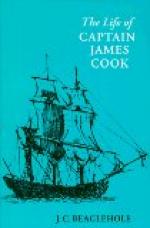On arrival Cook was informed his old friend Oree was coming to see him, so he went ashore to meet him. The boat was hauled up close to the chief’s house, and then five young plantain trees, as emblems of peace, were carried on board one by one, the first three being each accompanied by a young pig with his ears ornamented with coconut fibre; the fourth was accompanied by a dog; and the fifth by the bag which Cook had given Oree in 1769, containing the pewter plate with the inscription relating to the Endeavour’s visit, and the beads, and imitation coins. On the advice of his guide, Cook decorated three of the plantains with nails, medals, beads, etc., and he, Furneaux, and Forster, landed with them in their hands. They were requested to sit down, and the trees were taken from them and placed before Oree, the first for God, the second for the king, and the third for Friendship. The chief then came forward and greeted Cook in a most affectionate manner, the tears trickling down his cheeks. Further presents were then exchanged, and the ceremony was over.
Sparrman’s misadventure.
Here they were able to purchase a plentiful supply of everything, pigs, fowls, and fruit, and Cook says if he had been able to stay longer he might have bought as much more as everything seemed abundant. The only disagreeable thing that happened was to Mr. Sparrman, who, out by himself botanising, was set upon and stripped of everything but his trousers—Besant substitutes spectacles for trousers. He made his way towards the boats, and was befriended by a native, who gave him some cloth to put over his shoulders and escorted him to the others. When Oree heard of the affair he placed himself in Cook’s hands, and did his best to find out the culprits, and after a time Sparrman’s hanger and the greater part of his things were recovered. It seems probable that some native law had been unwittingly broken and Sparrman’s treatment was meant as a punishment, for every one else had been particularly well treated. Before leaving Cook added to Oree’s treasures a copper plate on which was inscribed, “Anchored here, His Britannic Majesty’s Ships Resolution and Adventure, September 1773.” Some medals were also given him, and he was requested to show them to any visitors that came.
At Ulietea they were received at a heava or dramatic performance, one portion of which illustrated robbery by two men, and Cook says it was acted “in such a masterly manner as sufficiently displayed the genius of the people in this vice.” Fruit and vegetables being rather scarce, Mr. Pickersgill was despatched with a boat from each ship to an island Cook calls O’Taha, where they were said to be plentiful, and he was able to purchase as much as they had means to pay for, at a very reasonable rate; but during negotiations the bag containing the trade was stolen. Pickersgill at once seized everything of value he could lay his hands on, signifying at




